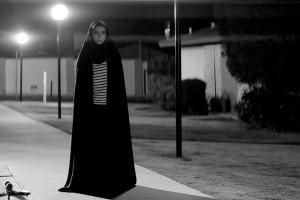 Review: Limited Run
Review: Limited Run
A Girl Walks Home Alone at Night | Ana Lily Amirpour | USA | 2014 | 99 min
Union South Marquee Theater, Friday, February 20 at 9:00pm; Saturday, February 21 at 6:00 pm»
The Girl walks the streets of Bad City, an Iranian ghost town. The feature film debut of Iranian-American director Ana Lily Amirpour stylishly scares in a genre hybrid of horror, westerns, and film noir.
The first thing you will notice when watching A Girl Walks Home Alone at Night is the cinematography. The film opens with Arash (Arash Marandi) walking through the streets of Bad City (a desolate Iranian town) holding a cat. The compositions are meticulously designed, making every shot aesthetically pleasing. Extreme canted angles make Arash seem like he is walking up a hill, and extreme long shots of him next to a white building immediately reminded me of similar compositions in Eraserhead. The small black figure in front of a looming white background suggests how small Arash is in Bad City. These compositions, as well as the black and white imagery, establishes the tone for the hybrid of horror and western genres in the film.
Much of the story is told through action and style, rather than dialogue. We learn early on that Arash has prudently saved his money to afford his car, a really fancy ride. His father, Hossein (Marshall Manesh, best known as Ranjit from How I Met Your Mother), is a heroin junkie, so we understand how difficult saving money must have been. His father can’t afford his drug addiction, and when the dealer, Saeed, comes to collect payment he takes possession of Arash’s car.
Because Saeed took the nice car, and because he is a scumbag, we are predisposed to cheer against him when he encounters The Girl (Sheila Vand). The Girl is roughly in her early 20s, usually wearing a black and white striped shirt and a cloak covering everything but her face. She puts on her makeup heavily and has a very calm, reserved expression most of the time, except when she is tearing into her victims. The killing scenes are gory. The sped up movement and heightened sounds add to the vulgar attacks. Her unsympathetic killings and apathy about everything else make The Girl a badass, and besides these things not much else is exposed about her. She is difficult to understand her motivations, and therefore impossible to decide how we should feel about her murders.
We don’t see another side of The Girl until she meets Arash, whom she treats differently than every other character. The Girl feels obligated to protect a prostitute, Atti (Mozhan Marno), but she treats her as an inferior. With Arash, The Girl acts ashamed of being a vampire, and of doing bad things. Despite their attraction, helping Atti eventually leads The Girl into a conflict with Arash’s dad, Hossein, complicating their already strange situation.
Everyone in Bad City seems isolated and therefore the film speaks of loneliness and what it means to find a companion. A Girl Walks Home Alone at Night adds to the horror genre a film much like Let the Right One In: a piece of work a lot deeper and stylistic than what is usually expected with vampire films. The horror genre shows through with violent, bloody killings, yet the more meaningful aspects of the story are told through similar devices as seen in film noir and westerns. Though the film was scary, the story was told subtly through performance and style. Every bit of detail was thought-out and delicately placed. The film is aesthetically stunning, and the style alone creates enjoyment. Sheila Vand as The Girl, despite her reserved manner, produces a dynamic character through subtle movements and facial expressions. Vand needed to be very conscious and careful with her delicate movements in order to make The Girl likable, scary and dynamic. And watching Marshall Manesh as an angry drug addict is bizarre experience in itself. A Girl Walks Home Alone at Night is a terrific film that indicates great things to come from director Amirpour.